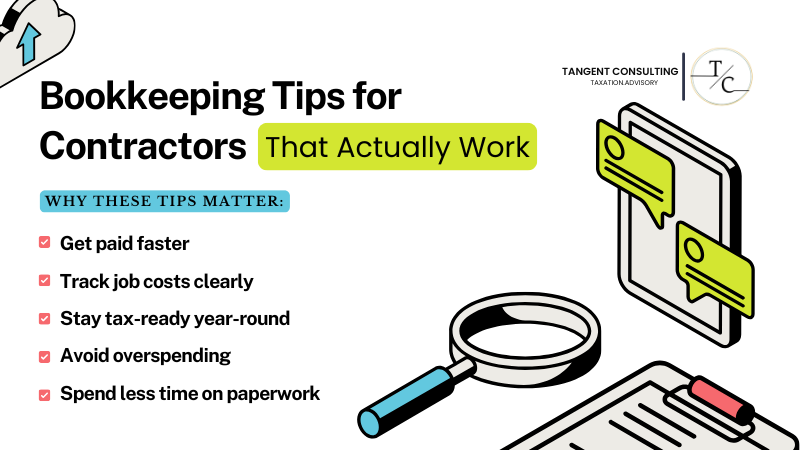Top 5 Bookkeeping Tips for Contractors That Actually Work
Top 5 Bookkeeping Tips for Contractors That Actually Work

A raccoon once shut down our client’s job site. It slipped into the drywall stacks overnight, and the next morning, the entire crew stood there, watching it hiss from behind a pallet of insulation. No work got done for hours.
Now, you’d think that was the biggest problem that week. But it wasn’t. What actually wrecked our client’s schedule was realizing he forgot to invoice for half the materials used on a previous job.
That’s the thing with the construction business. On-site chaos is part of the deal. But behind-the-scenes financial chaos is avoidable, and it usually comes down to building a proper bookkeeping system.
So, if you’re tired of not knowing where your money’s going or finding out too late, you’re in the right place. These are the Top 5 Bookkeeping Tips for Contractors That Actually Work.
Let’s get started!

Why Bookkeeping Matters for Contractors?
According to the Bureau of Labor Statistics, around 1 in 5 new businesses don’t make it past the first year, and nearly half shut down within five years.
One of the biggest reasons is poor financial management. That’s why bookkeeping matters for contractors. A well-organized bookkeeping system helps you manage cash flow, set budgets, and make smart financial decisions before small issues snowball into bigger problems.
Now, there’s a big difference between general bookkeeping and bookkeeping for contractors. Construction bookkeeping gets a little more technical. You’re not just looking at your business as a whole; you’re breaking down the numbers for each project.
That means tracking job costs, understanding how much you’re making per project, and adjusting things when they’re off track.
Let’s not forget that construction projects can last months or even years, adding extra layers. You’re managing job costing, billing schedules, subcontractor payments, and invoicing on time. If you miss any of those things, things can get super messed up.
Plus, there are industry rules you need to follow, such as retention rules, lien rights, and wage compliance. Your bookkeeping system needs to reflect all of that.

Top 5 Bookkeeping Tips for Contractors
Let’s come to the part that you have been waiting for. We don’t want to keep you waiting, so let’s jump into the top 5 bookkeeping tips.
1. Keep Your Personal and Business Expenses Separate
When you’re just getting your business off the ground, it might feel easier to swipe the same credit card for everything or use your personal bank account for a few business expenses.
But trust us, that shortcut can come back to bite you.
Mixing personal and business expenses is a bookkeeping disaster waiting to happen. You’ll waste hours later trying to untangle what belongs where especially at tax time.
More importantly, it can mess with your legal protections. If you’re incorporated and a court sees that you’ve blended your finances, it could strip away your liability protection—piercing the corporate veil, and your assets could be on the line.
So what should you do?
Open a separate business checking account and business credit card from day one. It’s a simple move that will clean up your bookkeeping, protect you legally, and help you stay organized.
It’s also smart to have a business savings account on the side to build up a cushion for big, unexpected expenses, because they will happen.
Just remember that business accounts often have different rules than personal ones, such as minimum balances, transaction limits, and fees. So, double-check the terms before you get hit with surprise charges.
If you haven’t set up a business account yet, Ramp offers corporate cards that come with built-in expense management, bill pay, and invoice tracking features. It’s a great way to keep your bookkeeping system organized and cloud-based from the start. Plus, there’s a bonus waiting for you if you sign up through our link.
2. Build a Simple, Consistent Bookkeeping System
If there’s one secret to better bookkeeping, it’s to stay organized and consistent. You don’t need anything fancy, just a simple and clear system that works for you.
Start by figuring out what kind of records you need to keep. For most contractors, that means receipts, invoices, bills, job estimates, and maybe even a few project notes.
After that, sort everything into easy-to-understand categories, such as materials, labor, subcontractors, equipment rentals, and client payments.
A solid chart of accounts will make it easier to review income and expenses or prepare financial statements.
You can go old-school with paper folders, but most contractors find it easier to go digital. Whether you use bookkeeping software or a basic cloud folder setup, keep everything labeled and easy to find.
Cloud-based tools also come in handy when you need access from the job site or want to collaborate with an outsourced bookkeeper or your virtual CFO.
To stay on top of everything, set a regular reminder to update your records, maybe once a week or every couple of days.

3. Use Job Costing to Stay on Top of Project Costs
Guessing pricing on each project is a sure way to lose money. That’s where job costing comes in. It might sound complicated, but once you get the hang of it, it’s one of the best tools you’ll ever use to control your finances.
With job costing, you break down each project into three main buckets: labor, materials, and overhead. Here’s how it works:
- Labor: Multiply your crew’s daily rate by the number of days it will take to finish the job. Remember to include payroll taxes or other employment-related costs.
- Materials: Add up everything you need to get the job done. Include direct costs (like lumber or wiring) and indirect ones (like delivery fees or small tools).
- Overhead: This covers the behind-the-scenes stuff like rent, office salaries, insurance, utilities, marketing, travel, and professional fees.
4. Don’t Forget to Track Contract Retainage
If you’ve ever finished a job and realized you’re still waiting on a part of your payment, that’s contract retainage. It’s common in construction, and it usually means 5% to 10% of your contract value is held back until the project is fully wrapped up.
The key here is to plan for it. You don’t want to be blindsided when a client holds off on paying the full amount. So, when budgeting a project or sending out invoices, ensure retainage is part of your bookkeeping system.
Here’s an easy way to handle it: split your invoice into two parts.
First, show what work has been completed—include the milestone reached and the full amount earned so far. Then, in a separate line, show the retainage as a credit (basically, money earned but not yet received). That way, the net amount clearly shows what the client owes you.
Once the project is finished and everything’s signed off, you’ll send a final invoice for the retainage amount. This keeps your income and expenses accurate and helps avoid cash flow confusion, especially if you’re tracking multiple jobs at once.
Don’t Let Your Books Hold You Back 🚀
Most business owners know they *should* get a handle on their finances — but don’t know where to start. That’s where we come in. Book a free 1-on-1 call with Tangent Consulting and let’s untangle your numbers together.
5. Know When to Bring in a Pro
As a business owner, you’re used to doing a bit of everything: managing jobs, handling customers, and maybe even chasing down invoices. But bookkeeping? That’s one hat you don’t have to keep wearing forever.
Start by asking yourself: how much time do you spend on books? Put a dollar value on that time. Then, compare it to the cost of hiring a bookkeeping service or an outsourced bookkeeper.
You might be surprised how much more you could get done (and earn) by handing it off to someone who does this stuff every day.
And you’re not limited to someone local anymore. Virtual bookkeeping and online accounting services give you all the support of an in-house bookkeeper—without the overhead.
They’re often more affordable, flexible with hours, and already familiar with tools like cloud-based accounting software, job costing for contractors, and even preparing your year-end financial statements.
Final Thoughts
When your books are organized, your decisions get sharper, your stress levels drop, and your business grows.
By following these bookkeeping tips, you’re building a system that supports better financial decisions and smoother operations.
For over a decade, we’ve been helping hardworking pros—contractors, handypeople, and small business owners—ditch the overwhelm and take control of their finances.
Let’s get your bookkeeping system working for you!
P.S. If you are reading this, it means you can have access to our free consultation for your business. Avail this for free today before we change our mind 😉
FAQs
What is the best accounting software for a contractor?
QuickBooks Online, Xero, and Buildertrend are popular picks. They offer job costing, cloud access, and tools built for the construction business.
What accounting method is used in construction?
Most contractors use the percentage-of-completion or completed-contract methods, depending on project length and revenue size.
What are the ledgers for construction?
Common ledgers include job cost ledger, general ledger, accounts payable, and accounts receivable.
